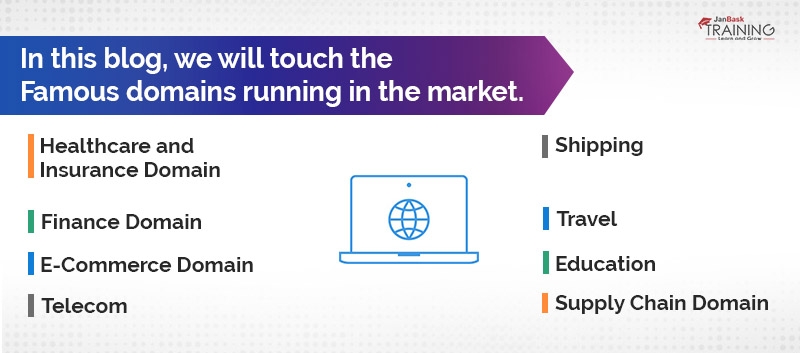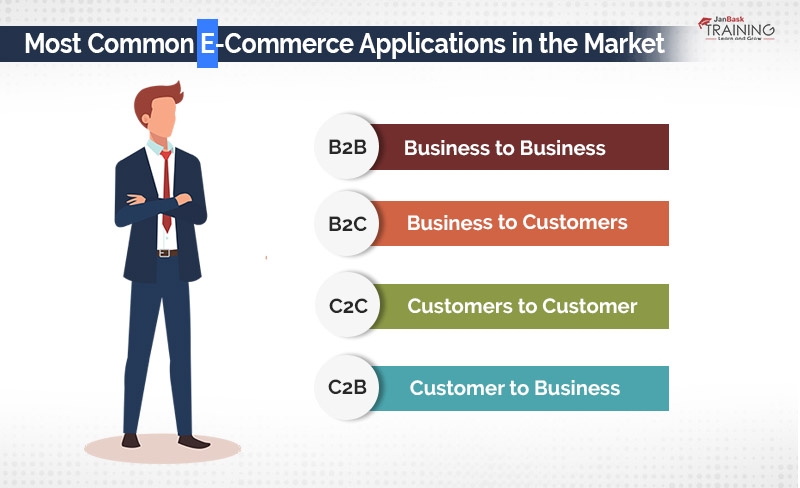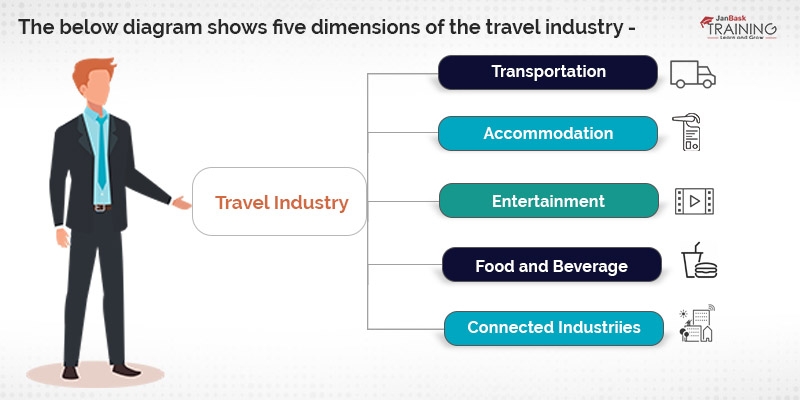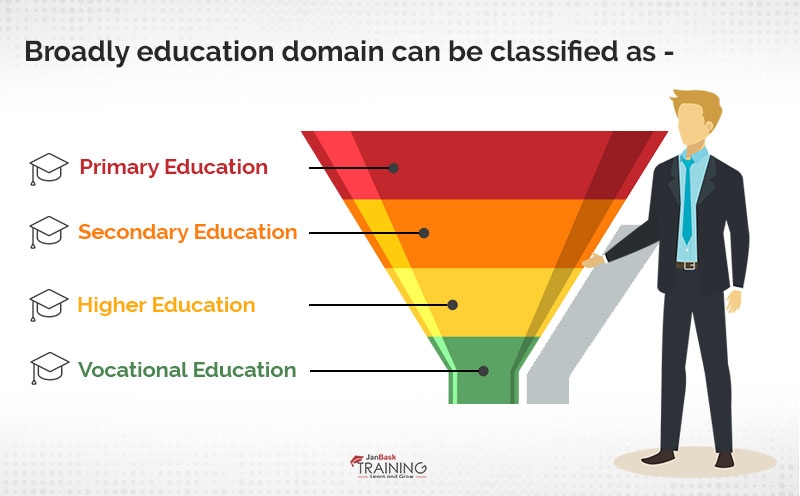09
JanNew Year Special : Get 30% OFF + $999 Study Material FREE - SCHEDULE CALL
Domain knowledge in its self speaks so much like a vast ocean. Each domain revolving in the industry holds great value for the market to run, and to have prompt domain knowledge is very difficult. But yes, the more knowledgable you are of your domain, the more business you can bring to your organization. It’s like becoming the subject matter expert of the market in which your company is functioning. Domain knowledge straightens many verticals, and improvise efficiency, quality and revenue generation by the business analyst. The good command over the domain resolves many issues before it could even reach the development team to debug, as the business analyst could say this how it is being designed as per the market. It makes you capable to judge and understand the protocols that are defined for that particular domain in the market and take a good check on the competitors.

In this blog, We will touch the famous domains running in the market and what all information a business analyst should be knowing about it.
Insurance holds a very important part of the healthcare sector. However, both are equally vast topics separately, so when they collaborate they become huge. The healthcare follows its norms both for payers and providers and seeing that everything which is being dealt with in the healthcare domain should in compliant with HIPAA and PHI. The challenge of this domain that it directly impacts a person’s life, and that’s the reason it is a very challenging domain and it stands out separate from other domains. The industry revolves around medicines, hospitals, care, healthcare data, diseases, ICD codes, diagnosis codes, and medical claims. There are multiple healthcare systems that revolve in the industry public, private or mixed group healthcare systems.
But healthcare is incomplete with insurance. In simple terms, health insurance is an agreement, which happens between an individual and insurance companies, where the insurer has to pay some or entire amount for your healthcare expenses. The company providing the insurance is termed as Insurance Provider or the payer. Provider could be anyone who is providing medical aid, doctor, nurse, hospital clinic, etc.
As a business analyst knowledge of these terms is important to understand the relationship of each one of the members enrolled. The other complexity comes when one has to understand the health plan which as there are multiple plans available with the payer. With so many health issues in the world today the insurance market is increasing drastically. Also, it results in millions of insurance claims every day, which is opening gate for new technologies which can handle such huge data.
According to me, this super famous domain is the core of all the domains as each and every domain runs a business, and any business is incomplete with any financial flow. But in general, finance revolves around banking (retail and private), management of money, credit–card organizations, accounting principles and any investment funds involved.
It can have said to be a global approach that refers to multiple ranges of economic facilities, provided by various financial bodies in the market. Earlier it was usually termed as financial services, but when technology started interacting with these services, the concept started to be called a financial domain.
Broadly finance domain works on three pillars – Banks, Insurance, and Other Financial Bodies
Banks –
Insurance –
Other Financial Bodies –
Read: What is the Truth Behind the Demand of Business Analysts in Canada?
I would say this as the new trend and widely accepted domain that gained popularity in no time. And yes thanks to technology and the internet, we all are using this domain so much. But there are some core components which if a BA is aware, its helps to scale the business. E-commerce or electronic commerce is a domain that facilitates the buying and selling of products over the internet.
They are supported by web applications, mobile applications, and some social networking channels.
They include payment gateways for transactions, electronic fund transfer, or some kinds of wallets that are given by the e-commerce companies itself.
The whole idea of e-commerce buying and purchasing revolves around the customer order which forms the key component to derive the financial reconciliation of the order.
The product gets instant availability in the world market thus removing the geographical dependency.
Most Common E-Commerce Applications in the Market -

Recent studies show that the telecom industry is performing very well in the market. Telecommunication is so vital that it is called a central nervous system of the Information Technology Industry. As the name speaks for itself, this domain deals with the exchange of information over the telephone. In recent times if I have to say the commonly used channels then it would be - telephone, radio, telegraph, mobile phones, optic fiber, internet, satellite communications. Now, these revolve around multiple other dependent factors such as cables, data, voice, broadband, servers, strong network, infrastructure, computers, etc.
Now, see as a business analyst how difficult and complex it would be to have an in-depth idea of this domain. People get involved for years to become subject matter expertise in these domains, and that’s why I feel it is great if someone has a deep understanding of the telecom industry.
Telecom plays a major role in the world economy because of its vast and extensive usage. This industry involves key players of service providers in the market as they are the ones who are responsible for high frequency and high-speed data. In the current situation, every individual uses mobile phones, so imagine how many data points are linked to just one single phone. Telecom industry handles long distance, short distance, satellite, LAN, WAN, wireless, all modes of communication and as an analyst knowledge of all these helps us to take a deep dive in this domain.
The domain holds its command over the physical movement of goods with the intention to do trade forms shipping domain. The international shipping industry contributes to major amount in the world economy, because of import/export happening at such a low cost. Imagine a scenario, if there is no import/export in the world, the world would starve as we all know not everything is available at every place because of geographical conditions. Or, think if entire import/export happens via costly modes of transportation, then the prices of goods would have been so high that it would have really disturbed the economy.
When shipping goods haven, international conventions and protocols should always be taken into consideration as certain goods could be dangerous or they fall under special regulations. The biggest challenge which an analyst could face is that he/she needs to have access to the basic industry’s notions. This helps them to better understand all the verticals of the shipping industry. Two very basic terms used in this domain is – FCL (Full Container Load) and LCL (Less than Container Load).
Read: What is a Business Analyst? Technical & Non-technical BA Skills
As business analysts, we should be aware of the basic weight and dimensions of the containers. Also, knowledge on the payment modes, various charges such as Commercial, Season Specific, Operations Cost and Charges on the equipment needs to be cleared. This domain is quite complex and vast in itself, and thus it takes time to get a full grip on this domain.
Learn Business Analyst in the Easiest Way

One of the top-notch domain among all the domains in the industry is Travel Domain. A domain that focuses on all travel-related enquires and features for an individual or organization. There are companies that put forth products, services or any relevant content related to the travel domain. Any business analyst working in the travel domain must hold knowledge on the flight’s system, hotel system, packages, visa rules, customer order, supplier order, and competitors.
When one working in the travel domain you must be careful that this domain is associated with the movement of people from one place to another, the products they use and services offered to them. That’s the customer service becomes very important here and is often linked to the services in the hospitality industry.
The value of strong products and services is needed as this domain caters to many businesses revolving around the market. Thus, it becomes essential to keep track of the revenue management system linked to the product so as to analyze the customer behavior which in turn would increase the revenue of the product and enhance the quality of the product.
Technically travel domain works on APIs (Application Programming Interface) and all the OTAs consume these APIs for their products and services. Travel agencies receive a good commission from the supplier side for the bookings they make for the particular travel supplier.
The below diagram shows five dimensions of the travel industry -

With so much globalization and technology storm, all the new domains are finding its way in Information Technology. Education domains demand knowledge in schools, colleges, universities, private institutions and now even online teaching.
There are various verticals in which education domains function. Organizations cover colleges and universities as well as various training modules to impart to their clients. There are companies that work with finance domain organizations that build a complete system for any schools and colleges. The various features which these organizations offer could be Resource Planning at the enterprise level, student information system, customer relationship management system.
Another vertical in which organizations are working in this sector is the online connection between students and teachers globally. This is making them earn quite a good commission from the parties and building a huge financial benefit with this sector. The target audience for education domain companies is other consulting firms, individuals, schools, colleges, tutors and learners.
Read: Effective Business Analysis Tools - Turn Raw Data Into Actionable Insights Fast!utes
If you see a holistic view, this sector is responsible to impart new skills to people, grow up the ladder of employment, meet the changing economic demands, and creating a connection between students and teachers.
Broadly education domain can be classified as -

The domain that deals with the management of goods and services movement, storage of raw materials, movement of processed goods from source to destination forms supply chain domain. In short, it creates a networking system that consists of facilities and distribution channels that encircle procurement of items, its production, assembling the things and finally making its successful delivery to customers. It needs proper planning, collaboration, and execution to carry out a complete supply chain cycle.
Now, each of these phases has some important elements which need to be taken care of –
Planning Phase –
Collaboration Phase –
Execution Phase –
When all the above are carries appropriately it results to prompt implementation and delivery.
Business Analyst Training & Certification

Well becoming a domain expert takes lots of time, patience and dedication to learn about that domain. This blog was to give an overview of how impactful is domain knowledge on the work of the business analysts. I hope you had a great learning experience. Happy Learning!!
Read: What are Business Requirements, it's Types, Processes & its Importance?
 Pinterest
Pinterest
 Email
Email
The JanBask Training Team includes certified professionals and expert writers dedicated to helping learners navigate their career journeys in QA, Cybersecurity, Salesforce, and more. Each article is carefully researched and reviewed to ensure quality and relevance.

Cyber Security

QA

Salesforce

Business Analyst

MS SQL Server

Data Science

DevOps

Hadoop

Python

Artificial Intelligence

Machine Learning

Tableau
Search Posts
Related Posts
What is important to know about UML Concepts and Overview
![]() 5.4k
5.4k
How Business Process Analysis can Ease Your Pain?
![]() 5.2k
5.2k
Business Analyst Job Description 2025: Key Responsibilities
![]() 981.1k
981.1k
Understand The Background Of Business Analysis Documentation Now
![]() 12.6k
12.6k
SDLC Models Is Bound To Make An Impact In Your Business
![]() 17.9k
17.9k
Receive Latest Materials and Offers on Business Analyst Course
Interviews